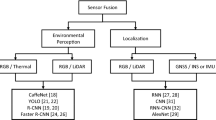Abstract
Asian countries are global frontrunners in artificial intelligence (AI) technology. During the last decade, China, India, Japan, and South Korea especially have been able to improve their IT infrastructure and achieved rapid digitalization. Now, they are on the way to transforming their manufacturing focus from low-tech to high-tech and to developing new digital-based business models. The development of local companies has been strongly supported by ambitious governments. Most importantly, the latter have increased investment in human capital and supported AI research and development (R&D) by academic institutions and companies.
Access this chapter
Tax calculation will be finalised at checkout
Purchases are for personal use only
Similar content being viewed by others
Notes
- 1.
Cambridge Dictionary: Artificial Intelligence, online: https://dictionary.cambridge.org/de/worterbuch/englisch/artificial-intelligence.
- 2.
Kühl, Niklas et al. (2019): Machine Learning in Artificial Intelligence: Towards a Common Understanding. Conference Paper. Hawaii International Conference on System Sciences. Online: https://scholarspace.manoa.hawaii.edu/bitstream/10125/59960/0520.pdf.
- 3.
Parson, Edward et al. (2018): Artificial Intelligence in Strategic Context: An Introduction. UCLA AI Pulse Paper.
- 4.
Chui, Michael et al. (2018:7): Notes from the AI frontier. Insights from hundreds of use cases. McKinsey Global Institute. Discussion Paper April.
- 5.
Deloitte (2016) 2016 Global Manufacturing Competitiveness Index. Online: https://www2.deloitte.com/global/en/pages/manufacturing/articles/global-manufacturing-com.petitiveness-index.html.
- 6.
UNIDO (2018): Competitive Industrial Performance Index. Online: https://www.unido.org/sites/default/files/files/2019-05/CIP_Report_2019.pdf.
- 7.
Chui, Michael et al. (2018:12): Notes from the AI frontier. Insights from hundreds of use cases. McKinsey Global Institute. Discussion Paper April.
- 8.
Lee, Kai-Fu and Matt Sheehan (2018): China’s Rise in Artificial Intelligence: Ingredients and Economic Implications, in Governance in an Emerging New World, Hoover Institution. Online: https://www.hoover.org/research/chinas-rise-artificial-intelligence-ingredients-and-economic-implications.
- 9.
NITI Aayog (2018): National Strategy for Artificial Intelligence “AI for all.” Online: https://www.niti.gov.in/writereaddata/files/document_publication/NationalStrategy-for-AI-Discussion-Paper.pdf?utm_source=hrintelligencer.
- 10.
Strategic Council for AI Technology (2017): Artificial Intelligence Technology Strategy. Online: https://www.nedo.go.jp/content/100865202.pdf.
- 11.
MIIT (Ministry of Industry and Information Technology) (2017): Three-year action plan of promotion of the new generation of artificial intelligence industry (2018–2020).
- 12.
China State Council (2017): New Generation of Artificial Intelligence Development Plan, State Council Document No. 35. Development Solutions (2018:5): China’s “1 + N” funding strategy for Artificial Intelligence. Improving EU Access to National and Regional Financial Incentives for Innovation in China.
- 13.
KAS (Konrad-Adenauer-Stiftung) (2018:39–40): Vergleich nationaler Strategien zur Förderung von künstlicher Intelligenz, Teil 1.
- 14.
Jia, Kai et al. (2018): The Application of Artificial Intelligence at Chinese Digital Platform Giants: Baidu, Alibaba and Tencent. ETLA The Research Institute of the Finnish Economy, No. 81. Online: https://pub.etla.fi/ETLA-Raoirtit-Reports-81.pdf.
- 15.
Development Solutions (2018): China’s “1 + N” funding strategy for Artificial Intelligence. Improving EU Access to.
National and Regional Financial Incentives for Innovation in China.
- 16.
Statista (2019): Artificial Intelligence (AI) related initial government budget in Japan from 2016 to 2018.
Online: https://www.statista.com/statistics/947277/japan-artificial-intelligence-related-government-budget.
- 17.
GTAI (Germany Trade and Invest) (2019a): Japan will sich mit künstlicher Intelligenz modernisieren. Online: https://www.gtai.de/GTAI/Navigation/DE/Trade/Maerkte/suche,t=japan-will-sich-mit-kuenstlicher-intelligenz-modernisieren,did=2294974.html.
- 18.
KAS (Konrad-Adenauer-Stiftung) (2018:40): Vergleich nationaler Strategien zur Förderung von künstlicher Intelligenz, Teil 1.
- 19.
GTAI (2019b): Regierung treibt „Digital India “ voran. Online: https://www.gtai.de/GTAI/Navigation/DE/Trade/Maerkte/suche,t=regierung-treibt-digital-india-voran,did=2232312.html.
Srivastava, Sunil Kumar (2018): Artificial Intelligence: Way Forward for India, in: Journal of Information Systems and Technology Management – Jistem USP, Vol 15.
- 20.
Parson, Edward et al. (2018): Artificial Intelligence in Strategic Context: An Introduction. UCLA AI Pulse Paper.
Lavrentyeva, A.V. et al. (2019): Artificial Intelligence and Digital Transformations in Society, in: IOP Conf. Series: Materials Science and Engineering 483 (2019) 01 2019. Online: https://doi.org/10.1088/1757-899X/483/1/012019.
Cath, Corinne (2018): Governing Artificial Intelligence: Ethical, Legal and Technical Opportunities and Challenges, in: Phil. Trans. R. Soc. A, 376: 20,180,080. Online: http://dx.doi.org/10./1098/rsta.2018.0080.
- 21.
European Commission, Digital Single Market (2018): EU member states sign up to cooperate on Artificial Intelligence, April 10. Online: https://ec.europa.eu/digital-single-market/en/news/eu-member-states-sign-cooperate-artificial-intelligence.
- 22.
Barton, Dominic et al. (2018): Artificial Intelligence: Implications for China. McKinsey Global Institute. Online: https://www.mckinsey.com/~/media/mckinsey/featured%20insights/China/Artificial%20intelligence%20Implications%20for%20China/MGI-Artificial-intelligence-implications-for-China.ashx.
- 23.
Bell, Ganesh (2018) Why countries need to work together on AI. World Economic Forum. Online: https://www.weforum.org/agenda/2018/09/learning-from-one-another-a-look-at-national-ai-policy-frameworks/.
- 24.
Nikkei Asian Review (2018): Japan and India pledge cooperation on AI and 5G, 30 October. Online: https://asia.nikkei.com/Politics/International-relations/Japan-and-India-pledge-cooperation-on-AI-and-5G.
- 25.
The Japan Times (2018): Japan, China plan to have an “innovation dialogue” with focus on self-driving vehicles, AI. 23 September 2019. Online: https://www.japantimes.co.jp/news/2018/09/23/national/politics-diplomacy/japan-china-plan-launch-innovation-dialogue-focus-self-driving-vehicles-ai/#.XVwKU3tCSUk.
Author information
Authors and Affiliations
Rights and permissions
Copyright information
© 2023 Social Sciences Academic Press
About this chapter
Cite this chapter
Schüller, M. (2023). Artificial Intelligence: New Challenges and Opportunities for Asian Countries. In: Exchanges and Mutual Learning Among Asian Civilizations. Research Series on the Chinese Dream and China’s Development Path. Springer, Singapore. https://doi.org/10.1007/978-981-19-7165-5_42
Download citation
DOI: https://doi.org/10.1007/978-981-19-7165-5_42
Published:
Publisher Name: Springer, Singapore
Print ISBN: 978-981-19-7164-8
Online ISBN: 978-981-19-7165-5
eBook Packages: Political Science and International StudiesPolitical Science and International Studies (R0)




